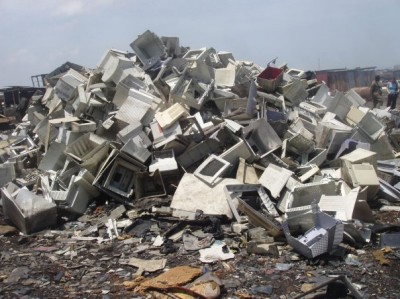Rapid progress in science and information technology, growing manufacturing activities, expanding urbanisation and increasing globalisation have elevated consumption and production for newer, better and faster electrical and electronic devices. With the growing use of these devices by businesses and households, the rate, at which people are constantly rejecting outdated product, is rapidly rising. Many of these are having short lifespan and not costlier to throw the old and buy the new one. These escalating obsolete and rejected electrical and electronic equipment, known as electronic-waste or e-waste, have become a significant concern to the society.
E-waste contain up to over 1000 diverse materials and components such as arsenic, copper, nickel, zinc, mercury, lead, and flame retardants. These substances are known to cause harm to humans and the environment if not properly disposed and recycled. The burning of e-waste like soldered material and plastic components in open areas lead to the release of toxic gases. Since these components are imperishable, they are threatening to the soil fertility. Moreover, the release of all these toxic waste and materials into rivers and oceans pose a danger to aquatic life. Safe disposal, safe and viable recycling, and reuse of outdated and old electronic goods are important and relevant issues of e-waste management. These materials require special handling and recycling methods, the absence of which leads to serious health and environmental hazards. There is also no viable market for some recycled materials.
E-waste management presents a huge challenge to everyone, including government, manufacturers and international organisations. In the international arena, Basel Convention is a remarkable initiative in response to outrage at the international trafficking of hazardous waste that entered into force in May 1992. Developed countries have relatively greater contribution both in creating and managing e-waste. Sometimes, developed countries export these rejected equipment to developing countries under the guise of aid. Among developing countries, China is well ahead in producing e-waste from others. Big corporations in different economies are taking actions to handle e-waste in a number of ways, from changing product designs to offering reuse and recycling programmes. But smaller businesses and residential PC-users have to find their own safe disposal programme.
Role of consumer awareness is crucial for e-waste management. Buying more responsibly made products contributes to reduce the problem of e-waste. Developed countries at least make it a point to impose fine on vendors and consumers who do not follow the laws. But, in developing nations, there are no strict rules and people are not much aware about the negative consequences and dangers of the improper disposal methods. In this connection, South Asia featured by exponential increase in e-waste; the lack of regulations regarding its safe disposal; the absence of a management infrastructure; and the lack of institutional capacity and general awareness to tackle the problem.
In Bangladesh, the ICT sector has turned out over 35 thousand tonnes of e-waste in the last 10 years, according to a recent survey conducted by Environment and Social Development Organisation. Reuse of e-equipment is a common practice and recycling and dismantling is a growing business in Bangladesh. Generally, dismantlers of rejected or obsolete equipment exist only in the informal sector, which is highly polluting. Computer recycling involves employing people to strip down computers and extract parts that can be used again in machines to be sold as refurbished products. The rest is then burned or dumped, both of which are highly hazardous to the environment. Workers taking apart the old machines handle toxic materials — this could pose serious health problems.
The country has no regulation specifically dealing with e- waste till date. Medical Waste Management Rules, 2008 addresses the waste management issues for the medical sector. As Bangladesh is a signatory to Basel convention, import of any kind of waste requires government’s permission. In the National ICT Policy, 2009, environment, climate and disaster management is identified as one of the ten objectives and aims to ensure safe disposal of toxic waste. Government has already prepared draft National 3R (Reduce, Reuse and Recycle) Strategy where e-waste issues are addressed. It is encouraging that recently the High Court of Bangladesh has prohibited scrap ships from entering the country without ensuring public health safety.
There are some scattered interventions where people have tried to rescue some parts of used PCs and reuse them in assembling a product for the local market in Bangladesh. One such initiative involves the conversion of monitor into television in the southern district of Bagerhat. Few corporate offices have taken initiative to distribute computers to different organisations for reuse. For example, Standard Chartered Bank has distributed their used PCs to schools. Some NGOs and Computer Jagat, an IT magazine, have been working to develop awareness to redistribute the used computers to schools in remote areas. In Bangladesh, Nokia tried to promote its green technology campaign in order to collect used mobile phones for its recycling plant.
Research activities and awareness on the issue is inadequate in the country. A recent study conducted by D.Net addressed the issue of quantifying e-waste and assessed the awareness level of residents in Dhaka city. There is no doubt that we need comprehensive study in the area for better understanding of the gravity of the problem and effective policy decision. Awareness campaign is essential through both traditional (newspapers, TV) and new media (web, blogs, social networks). The campaign should address policy makers as well as the general public. For consumer it is important that one should maintain and keep equipment as long as possible. People should donate their unwanted electronics for reuse. Government can support and encourage manufacturers to incorporate waste recycling plants as part of their production. Consumers need to know more about what to do with electronic waste. Very importantly, Bangladesh needs to enact laws and build infrastructure to ensure safe disposal of e-waste.



Recent Comments